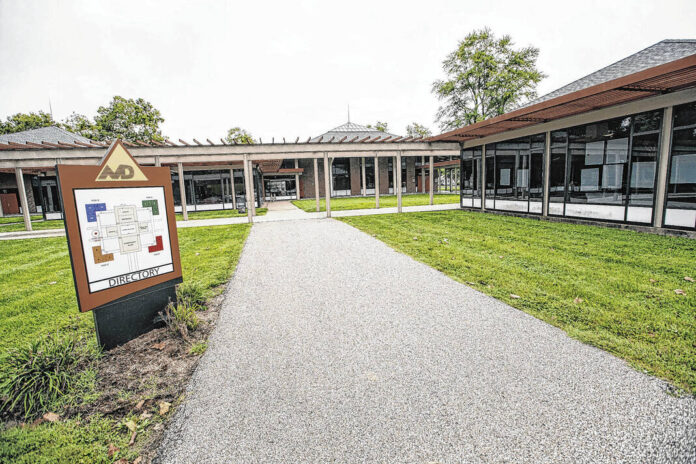
Mike Wolanin | The Republic An exterior view of the McDowell building in Columbus, Ind., Thursday, Sept. 29, 2022.
An investigation is underway by the U.S. Department of Education’s Office for Civil Rights to determine if Latino students enrolled in Bartholomew Consolidated School Corp. have been discriminated against when moved to alternative education programs within BCSC.
The complaint alleges BCSC has been “creating a pipeline of Latino ELL (English Language Learner) students to alternative education programs that are not designed to support the students’ success.”
The Office of Civil Rights (OCR) wrote in a notification letter to BCSC that it received a complaint against the school corporation on June 9, 2022, alleging discrimination on the basis of age, race, and national origin, as well as retaliation against the person making the complaint.
BCSC’s English Language Learner program is housed at McDowell Education Center, 2700 McKinley Ave., and also houses other education programs. Adult learners can work toward a high school equivalency diploma there.
In past years, McDowell offered a class to help adult Latino students improve their employability skills through a partnership with Cummins Inc. and Su Casa Columbus, a nonprofit organization that welcomes and serves the Latino community.
The center also previously started a partnership with Faurecia, using one of the company’s Columbus plants where a McDowell instructors taught English Language Learners classes. Most recently, McDowell’s staff received an award from the state for its efforts to help Afghan refugees learn English after arriving at Camp Atterbury in Edinburgh.
Superintendent Jim Roberts said the office notified BCSC of the complaint earlier this fall. He said the school corporation is cooperating fully with the investigation and “remains committed to ensuring that everyone is afforded equal protection under the law.”
“We believe that we have worked appropriately to do the things that benefit our students,” Roberts said.
It is Robert’s understanding that the investigation is still in early stages — he said he is not sure how long it will take to be completed.
The OCR responded to a Freedom of Information Act request from The Republic by providing copies of the complaint, the OCR’s notification letter to the school corporation and BCSC’s initial response.
However, these documents contain numerous redactions, which OCR officials said are due to exemptions related to personal privacy and the protection of “records or information compiled for law enforcement purposes from disclosure, but only to the extent the production of such records or information could reasonably be expected to interfere with enforcement proceedings.”
As stated in the office’s notification letter to BCSC, the complaint alleges that the school corp.:
1) discriminated against students based on age and national origin during the (redacted) and (redacted) school years when it declined to enroll them in the corporation’s (redacted).
2) discriminated against students based on race and national origin (redacted) during the (redacted) school years when it excluded them from meaningful participation in its educational programs by failing to provide the students with appropriate English Language (EL) services and when it failed to provide Limited English Proficient (LEP) parents with communications in their native language to ensure their meaningful participation in their children’s educational programs.
3) retaliated against an (redacted) for complaining of discrimination against students based on race and national origin when, beginning in the (redacted) school year, it subjected her to (redacted).
“Please understand that opening an investigation does not mean that OCR has made a decision about the complaint,” OCR officials wrote. “During the investigation, OCR is neutral; OCR will collect and analyze the evidence it needs in order to make a decision about the complaint.”
The submitted complaint refers to instances of students being denied enrollment in certain BCSC schools and/or programs. Due to heavy redactions, the exact details of these alleged occurrences are not clear.
The individual filing the complaint also alleges that the school corporation failed to sufficiently investigate her claims and added, “Retaliation against me has been persistent and ongoing ever since I brought these cases to light.”
The account of this alleged retaliation is also redacted.
When asked what remedy she seeks, the individual wrote that she wants policies in place to protect students’ rights and ensure that they are able to enroll in school.
“I would like a clear, safe, timely process for reporting discrimination with qualified, impartial people to investigate complaints,” the individual wrote. “I would like a policy in place that requires the involvement of the (redacted) in any decision around separating an ELL (English Language Learner) student from the regular education setting. I would like to stop the practice of creating a pipeline of Latino ELL students to alternative education programs that are not designed to support the students’ success.”
The OCR’s notification letter to BCSC included a request for several pieces of information, including its response to the allegations, its policies prohibiting discrimination and retaliation, and a number of documents related to its English Language services and communication with Limited English Proficient parents.
The OCR also requested to know “if any corporation employee discussed the immigration status of (redacted) students or (redacted) students in the (redacted) school years and/or contacted immigration officials regarding any potential students.”
This isn’t the first time BCSC has been investigated by the OCR, as the school corporation previously faced complaints in 1991 and 2002.
The former was filed in regards to the school corp.’s Joy Howe School, which was a program for emotionally handicapped students. The OCR found BCSC in violation of the Rehabilitation Act in two of five areas investigated — that facility services and activities were not comparable to those provided to non-handicapped students, and that students placed at the school were being denied appropriate related aids and services.
BCSC responded by assuring officials that the recommended changes would be made by November of that same year.
In 2002, a complaint was filed alleging that the school corporation committed national-origin discrimination by providing an inadequate English as a Second Language program.
Vaughn Sylva, who was BCSC’s assistant superintendent of finance at the time, later wrote in a 2003 guest column that the school corporation had reached an agreement with the OCR and would add two teaching positions and five teacher assistants to accommodate the needs of students who did not speak English as their primary language.




